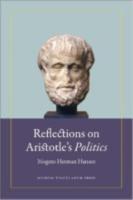
Copenhagen: Museum Tusculanum Press (2014) h/b 127pp £24.50 (ISBN 978876354062 9)
This neat little book contains eight studies of the Politics, of which seven are revised versions of previously published articles, and the eighth and last is an unpublished lecture given in 2012. They all deal with controversial questions about what exactly Aristotle means by some of the terms he uses. In the first, H. looks at Aristotle’s classification of types of constitution and shows how he starts with a ‘traditional’ six-fold model (kingship, aristocracy, oligarchy, politeia, democracy, tyranny) but later replaces it with a subtler model in which elements from these different forms are mixed to varying degrees: he argues that this second model explains a number of problems which are insoluble if we assume the first.
The second chapter discusses A.’s two definitions of polis, as a social organisation of all humans and as a political organisation of eligible ‘citizens’ (i.e. free adult males); H. says that A.’s view that the polis was unique to Hellenes is not supported by other sources, and questions the influence of A. in shaping the belief of many modern historians that most Greek poleis were independent communities before Philip of Macedon appeared.
In chapter 3, H. looks at the meaning of the terms polis, politeia and politeuma, and argues that politeia should be understood in a concrete sense, the structure of the citizen body, not merely abstractly as ‘government’. Chapters 4 and 5 take a further look at the polis and explain a single curious reference to the Arcadians, which H. thinks refers to the Arcadian federation of 370 BC and is A.’s only reference to federations in general.
The sixth chapter summarises A.’s discussion of what constitutes the ‘best’ polis. Chapter 7 compares A.’s definition of ‘freedom’ (eleutheria) with Plato and others, and shows that A. in a key passage is criticising two ideas of democratic freedom: arithmetic equality between all citizens irrespective of merit, and freedom to do as one likes, both of which to A. are incompatible with justice; neither A. nor Plato appears to have a positive view of freedom as a characteristic of a constitution. The final lecture returns to A.’s new model in which a combination of democracy with oligarchy is preferred, for example representative democracy, in which the citizens elect persons from a limited number of ‘competent’ people to run things and may submit them to scrutiny (euthunein); this ‘indirect democracy’ is closer to most modern democracies than the classical Athenian type, but H. suggests that it was more prevalent in ancient poleis than we tend to think, especially in early days (e.g. as in Solon’s time).
These essays are easy to read in spite of the tightness of their subject matter, and are all thought provoking. A general sense comes across of a work in progress: A. developing his thought as he writes, not completing everything he said that he would cover. The book would be a worthwhile adjunct for anyone covering Aristotle’s Politics as part of a political philosophy course, even if they are not classicists. That said, quotes are given in original languages and not always translated, although the most important ones are. References are full and indexed, and there are good notes and a bibliography.
Colin McDonald
